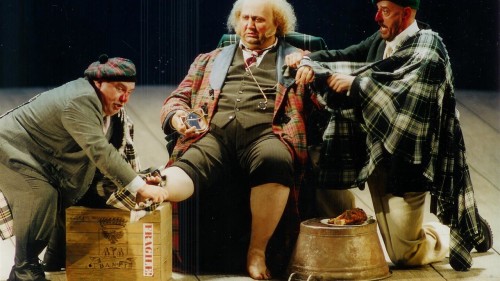 Germany Verdi, Falstaff: Soloists, Chor der Bayerischen Staatsoper, Bayerisches Staatsorchester / Asher Fisch (conductor), Nationaltheater, 19.3.2017. (MC)
Germany Verdi, Falstaff: Soloists, Chor der Bayerischen Staatsoper, Bayerisches Staatsorchester / Asher Fisch (conductor), Nationaltheater, 19.3.2017. (MC)

Verdi, Falstaff
Production:
Direction – Eike Gramss
Sets and costumes – Gottfried Pilz
Lighting – Manfred Voss
Cast:
Sir John Falstaff – Ambrogio Maestri
Alice Ford – Véronique Gens
Ford – Franco Vassallo
Mistress Quickly – Daniela Barcellona
Nanetta – Ekaterina Siurina
Fenton – Pavol Breslik
Meg Page – Daniela Pini
Doctor Cajus – Riccardo Botta
Bardolfo – Kevin Conners
Pistola – Alin Anca
This revival of Verdi’s Falstaff is the now well-established staging by Eike Gramss that was first given at the Nationaltheater in January 2001. Utilising Gottfried Pielz’s sets this production sadly stripped away most of what has been described as non-essential visual distractions giving focus to the comedy aspect of the libretto.
Dominating the stage all evening was a circular wooden platform sloped slightly downwards towards the audience; a device now all too common to opera audiences. To further focus the action, a curtain from the ceiling was drawn around the back and sides of the circular platform and used rather like a circus big top. To differentiate each scene an extremely limited number of props were used. For example, in Act I, Scene One instead of Windsor’s Garter Inn, we saw a chair by the wooden platform and some discarded wine bottles and the following scene depicted the garden by Ford’s house with the platform festooned with clothes lines with white sheets and towels pegged out. For most of Act III – originally set in Windsor Great Park – the audience had to suffer a view of the stage and cast that was semi-obscured by a curtain shot across occasionally with a few video projections.
Gottfried Pilz’s costumes were a rather unpalatable mishmash of styles which followed the theme of the Scottish tartan, predominantly an array of colourful kilts and tam o‘shanters with some even wearing tartan ankle boots. At one point a number of the cast were waving golf clubs menacingly around their heads, but I reckon Scotland’s association with the game of golf might have been lost on many of the audience. In the closing scene the large cast wore a hotchpotch of clothes in a muddled finale that seemed lacking in overall direction.
Verdi and his librettist Boito gave the lion’s share of the singing to Sir John Falstaff and Ford both demanding baritone roles, especially the former. Italian singers Ambrogio Maestri, as the rotund Falstaff, and Franco Vassallo, a cunning Ford in a black and yellow kilt, may not be the most glamorous names, but this is no reflection on their secure and intelligent singing. Maestri and Vassallo impressed from the first note to the last, together with most persuasive character portrayals.
It is hard to select a single stand-out from the female singers as their roles offer rather limited scope. All four singers did what they had to do with enthusiasm blended with professionalism. Celebrated soprano Véronique Gens was a spirited yet elegant Alice Ford, mezzo-sopranos Daniela Pini as Alice Page was both sensual and entertaining, and Daniela Barcellona – such a fine actress – was amusing in the role of Mistress Quickly. Nanetta played by soprano Ekaterina Siurina made the most of her role buzzing about the stage showing a real appetite for the task. As the love-struck Fenton, tenor Pavol Breslik sparkled and sang his sonnet ‘Dal labbro il canto estasiato vola’ with relish, displaying a lovely bright tone.
This evening music director Asher Fisch brought some splendid playing from the orchestra – both buoyant and compelling – with really impressive climaxes. Sung in Italian, German surtitles were provided but sadly none were in English which is disappointing for a major international opera house.
Verdi wrote a wonderful work in Falstaff, but sadly this Eike Gramss revival, in spite of some wonderful singing, felt lame and lacklustre.
Michael Cookson
